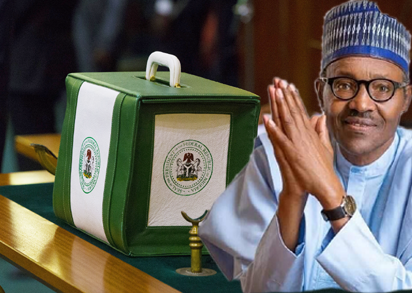
The lion’s share of President Muhammadu Buhari’s proposed N10.33 trillion 2020 ‘’budget of Sustaining Growth and job creation.” Went to the WORKS and Housing Ministry.
Sectors well favoured in the budget presented
to the joint session of the National Assembly include Power, N127 billion;
Transportation, N123 billion; Universal Basic Education Commission, UBEC, N112
billion; Defence, N100 billion; and zonal intervention projects, N100 billion
The 2020 Budget is N1.4 trillion higher than
the N8.9 trillion budget of 2019. President Buhari stated that the 2020 Budget
had been designed to be a budget of fiscal consolidation, to strengthen
macroeconomic environment; invest in critical infrastructure, human capital
development and enable institutions, especially in key job-creating sectors.
According to him, it is also aimed at
incentivising private sector investment essential to complement the
government’s development plans, policies and programmes; and enhance social
investment programmes to further deepen their impact on marginalised and most
vulnerable Nigerians.
President Buhari said the expenditure estimate
would include statutory transfers of N556.7 billion; non-debt recurrent
expenditure of N4.88 trillion; and N2.14 trillion of capital expenditure
(excluding the capital component of statutory transfers). He said debt
servicing was estimated at N2.45 trillion, while provision for Sinking Fund to
retire maturing bonds issued to local contractors is N296 billion. President
Buhari put estimated 2020 Federal Government revenue at N8.155 trillion, made
up of oil revenue N2.64 trillion; non-oil tax revenues, N1.81
trillion; and other revenues N3.7 trillion. He said this was seven per cent
higher than the 2019 comparative estimate of N7.594 trillion, inclusive of
government-owned enterprises. The President, who noted that investing in
critical infrastructure was a key component of fiscal strategy under the 2020
Budget Proposals, said that an aggregate sum of N2.46 trillion (inclusive of
N318.06 billion in statutory transfers) had been proposed for capital projects
in 2020. He said: “Although the 2020 capital budget is N721.33 billion (or 23
per cent) lower than the 2019 budget provision of N3.18 trillion, it is still
higher than the actual and projected capital expenditure out-turns for both the
2018 and 2019 fiscal years, respectively. ‘’However, at 24 per cent of
aggregate projected expenditure, the 2020 provision falls significantly short
of the 30 per cent target in the Economic Recovery and Growth Plan, ERGP,
2017-2020.” The President noted that Budget deficit was projected to be N2.18
trillion in 2020 and that this would include draw-downs on project-tied loans
and related capital expenditure. He stressed that this represents 1.52 per cent
of estimated GDP, well below the three per cent threshold set by the Fiscal
Responsibility Act of 2007, and in line with the ERGP target of 1.96 per cent.
According to him, the deficit will be financed by new foreign and domestic
borrowings, privatization proceeds, signature bonuses and draw-downs on loans
secured for specific development projects. President Buhari, who told the
lawmakers that Nigeria was committed to meeting its debt service obligations,
said further: “Accordingly, we provided the sum of N2.45 trillion for debt
service. Of this amount, 71 per cent is to service domestic debt which accounts
for about 68 per cent of the total debt. The sum of N296 billion is provided
for the Sinking Fund to retire maturing bonds issued to local contractors.”
President Buhari disclosed that there was a draft Finance Bill that proposes an
increase of the VAT rate from 5% to 7.5%, just as he said that the 2020
Appropriation Bill was based on this new VAT rate, adding that the additional
revenues would be used to fund health, education and infrastructure programmes.
He said that against the backdrop that states and local governments were
allocated 85% of all VAT revenues, greater quality and efficiency was expected
from them in their spending. “The VAT Act already exempts pharmaceuticals,
educational items, and basic commodities, which exemptions we are expanding
under the Finance Bill, 2019. ‘’Specifically, Section 46 of the Finance Bill,
2019 expands the exempt items to include the following: Brown and white bread;
cereals, including maize, rice, wheat, millet, barley and sorghum; fish of all
kinds; flour and starch meals; fruits, nuts, pulses and vegetables of various
kinds; Roots such as yam, cocoyam, sweet and Irish potatoes; Meat and poultry
products including eggs; Milk; Salt and herbs of various kinds; and Natural
water and table water. “Additionally, our proposals also raise the threshold
for VAT registration to N25 million in turnover per annum, such that the revenue
authorities can focus their compliance efforts on larger businesses, thereby
bringing relief for our Micro, Small and Medium-sized businesses,’’ the
President said.
Sectoral allocations
In the area of sectoral allocation in the 2020 Budget, Works and Housing got N262 billion; Power was allocated N127 billion; Transportation got N123 billion; Universal Basic Education Commission was allocated N112 billion while Defence got N100 billion as against N435.62 billion in 2019. According to the breakdown, Zonal Intervention Projects was allocated N100 billion; Agriculture and Rural Development got N83 billion; Water Resources, N82 billion; Niger Delta Development Commission got N81 billion. Education was allocated N48 billion as against the N462.24 billion that was allocated to it in 2019. Health was allocated N46 billion as against the N315.62 billion it got in 2019 Budget; Industry, Trade and Investment got N40 billion; North East Development Commission, N38 billion; Interior, N35 billion as against the N569.07 in 2019; Social Investment Programmes, N30 billion; Federal Capital Territory, N28 billion; and Niger Delta Affairs Ministry, N24 billion. In the budget, the sum of N556.7 billion has been provided for Statutory Transfers and these include: N125 billion for the National Assembly; N110 billion for the Judiciary; N37.83 billion for the North East Development Commission (NEDC); N44.5 billion for the Basic Health Care Provision Fund (BHCPF); N111.79 billion for the Universal Basic Education Commission (UBEC); and N80.88 billion for the Niger Delta Development Commission (NDDC), which is now supervised by the Ministry of Niger Delta Affairs. The President has equally disclosed that the government has increased the budgetary allocation to the National Human Rights Commission from N1.5 billion to N2.5 billion, explaining that the 67 per cent increase is to enable the Commission to perform its functions more effectively.
Source: By Henry Umoru, Levinus Nwabughiogu, Joseph Erunke, Omeiza Ajayi, Dirisu Yakubu & Tordue Salem




